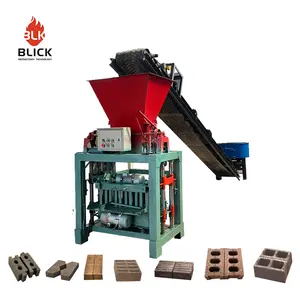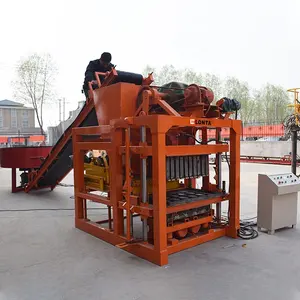
All categories
Featured selections
Trade Assurance
Buyer Central
Help Center
Get the app
Become a supplier

(1624 products available)














































Lightweight hollow block making machines are used to produce lightweight blocks for various construction projects. These machines are suitable for producing blocks in large quantities with high precision and efficiency. The main types of these machines are as follows:
Fully automatic lightweight hollow block making machines
Fully automatic lightweight hollow block-making machines are plants that can independently produce lightweight hollow blocks without the help of manual labor. This machine has a control system that is easy to operate and can be managed and controlled by only one person. Furthermore, the system has smart technology that will help in the efficient production of blocks. Fully automatic lightweight hollow block-making machines are equipped with advanced features like self-lubricating bush bearings, remote monitoring, and Siemens frequency control. This means the block-forming plant will produce a lot of blocks in a short time with high capacity. The automation of these fully automatic machines reduces the number of workers needed and improves the whole production process.
Semiautomatic lightweight hollow block making machines
Unlike the fully automatic type, semiautomatic lightweight hollow block-making machines still need a little bit of manual assistance during operation. Even with this little labor, it provides a more efficient and productive way to make blocks compared to fully manual machines. Semiautomatic machines are usually powered by hydraulic systems or have automated feeding and stamping processes. Moreover, the operators are still required to control the machine, supervise the block production, and manage the machine functions. Semiautomatic lightweight hollow block-making machines offer a good combo of manual work and automatic production. They are, therefore, a good choice for users who want to make blocks quickly and easily while still having some control over the process of making the blocks.
Mobile lightweight hollow block making machines
Mobile lightweight hollow block-making machines are easy-to-move units that can be used flexibly at different locations. The block-making device is small and has lightweight construction so that it can easily be transported from one worksite to another with the help of a forklift or by rolling it on castor wheels. Mobile machines are designed for versatility and can cater to multiple construction needs in various locations. These machines also come with a simple-to-use operation panel so that users can quickly set up and use the block-making machine as soon as it reaches the site. Furthermore, some mobile lightweight hollow block-making machines come with additional features like automated feeding systems and quick-change molds that improve block production efficiency and flexibility.
Specifications of light weight hollow block making machines can change based on the type, model, brand, and manufacturer.
The machine for making hollow blocks also needs care and servicing now and then. Its long-term use to produce blocks of hollow concrete will depend on regular maintenance.
The lightweight hollow block-making machine can benefit various industries and sectors that need lightweight hollow blocks for construction and other applications. Here are some of the key use scenarios of this machine:
Construction Companies and Contractors:
This type of machine is popular with modular construction firms. Such companies are in search of ways to optimize their construction processes. They usually make lightweight hollow blocks in large quantities for quick assembly in construction projects. The hollow blocks made serve as durable and lightweight structural elements.
Institution and Urban Development Projects:
Urban development projects led by public sector institutions make great use of the lightweight hollow block-making machine. Be it government bodies or city councils, these entities often seek efficient and cost-effective solutions for housing construction and infrastructure development. The blocks produced by the machine are ideal for such institutions in reducing weight and enhancing thermal insulation.
Industrial and Commercial Property Builders:
Lightweight hollow blocks are ideal for reducing costs and construction time in commercial and industrial property construction. Builders make use of the lightweight hollow block-making machine to produce more of these blocks in a short time. The blocks made are used for non-load-bearing walls, partitions, and enclosures in warehouses, factories, offices, and retail spaces.
Property Developers:
Property developers often look for efficient and scalable construction methods to maximize their development budgets. They can easily use the automated lightweight hollow block-making machine to create a cost-effective solution. The solution helps them reduce weight, speed up construction, and enhance the overall quality of their projects.
Export Markets:
Many lightweight hollow block-making machines have export markets. This is to meet the demands of international construction markets. Franchises and distributors are always looking for reliable machines with good production capacity. They facilitate the supply of lightweight hollow blocks to various construction industries.
How to choose light weight hollow block making machines
While choosing a hollow block making machine, buyers are advised to settle for those with customization features. Such machines allow buyers to tailor block sizes, shapes, and designs to specific construction needs. Furthermore, customization enhances product diversity, making it possible for business owners to meet various client requirements. Also, consider a machine that can accommodate different raw material combinations. Such a machine provides the flexibility to explore alternative mixtures, such as fly ash, rice husk ash, and slag, which can improve the lightweight hollow blocks' quality and cost-effectiveness.
When choosing a light hollow block making machine, buyers should also consider its automation level. This is because both semi-automated and fully-automated machines have distinct advantages that appeal to different types of users. Additionally, buyers might want to choose a machine compatible with various curing methods, such as steam curing, water curing, or air curing. This compatibility allows for consistent production and quality assurance, irrespective of the curing technique employed.
Additionally, buyers should choose a block-making machine that offers efficient energy consumption. Such a machine optimizes power usage, thereby minimizing electricity costs and environmental impact. Moreover, energy-efficient machines contribute to sustainable production practices. Buyers should also consider a machine with solid and durable construction. Such machines can withstand the demanding production environment, ensuring consistent block quality and minimizing downtime.
It is also important to note that the ease of operation and maintenance of the block-making machine is a significant consideration. A user-friendly machine can be set up quickly, ensuring smooth production processes. Additionally, a machine that is easy to maintain minimizes operational disruptions and guarantees longevity. Finally, while choosing a lightweight hollow block making machine, buyers should consider machines with good production speed. Such machines enhance productivity and help meet increasing market demands. Additionally, in commercial settings, they contribute to timely project completion and customer satisfaction.
Q: How does a light-weight hollow block-making machine work?
A: The working procedure of hollow block-making machines may vary according to their type and model. Generally, the following steps are involved in their working. Firstly, the raw materials are gathered and prepared for block making. After that, the material's mixture is formed and processed into block shapes through different methods. Finally, the blocks are cured and dried to complete the hollow block production. The entire procedure is automated and controlled through a central computer system.
Q: What are the benefits of light-weight hollow block-making machines?
A: The benefit of using a light-weight hollow block machine is that it produces lightweight blocks. Such blocks are easy to use, and their use enhances the construction project efficiency. In addition, these machines can be used to produce blocks at a large scale. Lastly, the automation and central computer control of these machines make them easy and convenient to use.
Q: What types of light-weight hollow block-making machines are available?
A: Several types of light-weight hollow block-making machines are available. They vary according to the production method, level of automation, and size and capacity. Some of the most common types include: Manual block making machines, Semi-automatic block-making machines, Fully automatic block-making machines, and Others.
Q: Are light weight hollow block making machines energy efficient?
A: Yes, modern light weight hollow block making machines are energy efficient. They reduce energy consumption and optimize production efficiency.
Q: Do light weight hollow block making machines require skilled operators?
A: It depends on the type and complexity of the machine. Automated machines may require regular maintenance from a skilled professional, whereas simple manual machines do not.